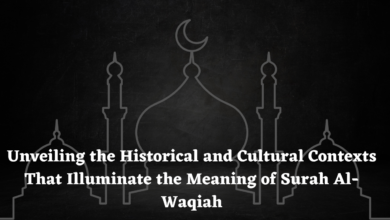
Introduction:
Islamism, often portrayed as a complex and controversial ideology, holds a significant position in the global discourse surrounding Islam and its socio-political implications. Rooted in the teachings of Islam, Islamism goes beyond mere religious practice and seeks to shape societies through political means. In this article, we will delve into the multifaceted aspects of Islamism, examining its origins, core beliefs, and the contemporary challenges it poses.
The Genesis of Islamism:
- Historical Context: Islamism’s roots can be traced back to the 19th and 20th centuries, amidst colonialism and political upheavals in the Muslim world. As Muslims confronted foreign domination and internal struggles, some began to seek answers within Islam to address these challenges.
- Pioneering Thinkers: Prominent thinkers like Sayyid Qutb in Egypt and Abul Ala Maududi in the Indian subcontinent played pivotal roles in shaping early Islamist thought. They laid the foundation for modern Islamism by emphasizing the return to Islamic principles as a means of achieving societal revival.
The Core Tenets of Islamism:
- Islamic State and Governance: At the heart of Islamism lies the belief in establishing an Islamic state governed by Sharia law. Islamists argue that adherence to Islamic teachings is essential for social justice and overall well-being.
- Rejection of Secularism: Islamists critique secularism, perceiving it as a Western imposition that undermines Islamic values. They advocate for a state where religion permeates all aspects of public life.
- Pan-Islamism: Another integral aspect of Islamism is the concept of pan-Islamism, uniting Muslims across geographical borders under a singular Islamic identity.
Islamist Movements and Organizations:
- The Muslim Brotherhood: One of the most influential Islamist movements, the Muslim Brotherhood, founded in Egypt in 1928, seeks to establish Islamic governance through grassroots activism and social welfare initiatives.
- Hezbollah: Originating in Lebanon, Hezbollah is a Shia Islamist organization with a military wing and a political party. It emerged in response to the Israeli occupation of Lebanon and has evolved into a significant regional player.
- Taliban: The Taliban, an Islamist group in Afghanistan, gained global attention for their strict interpretation of Islamic law during their rule from 1996 to 2001.
Islamism and Political Islam:
- Diverse Approaches: Islamism encompasses a broad spectrum, ranging from moderate to radical ideologies. Some Islamist groups actively participate in democratic processes, while others resort to violence to achieve their goals.
- Challenges to Democracy: The compatibility of Islamism with democratic principles remains a subject of intense debate. Critics argue that certain Islamist movements may exploit democratic systems to gain power and then undermine democratic values.
Contemporary Implications and Challenges:
- Global Terrorism: Radical Islamist groups like Al-Qaeda and ISIS have engaged in acts of terrorism, posing significant security challenges worldwide.
- Clash of Civilizations: Islamism has been a focal point of the “clash of civilizations” narrative, pitting Islam against the West. This perception has exacerbated tensions and contributed to Islamophobia.
- Impact on Human Rights: In some regions, the implementation of Islamist policies has raised concerns about the potential curtailment of human rights, particularly for women and minority groups.
Conclusion:
In conclusion, Islamism embodies a complex ideology with far-reaching impacts on the political and societal spheres within the Muslim world and beyond. A comprehensive grasp of its historical roots, fundamental principles, and present-day consequences is indispensable for engaging in meaningful dialogues and pursuing pathways to peaceful coexistence. The diversity among Islamist movements, with some embracing democratic norms and others resorting to violence, necessitates a deep examination of the underlying factors driving radicalization.
To foster inclusive and harmonious societies, it is imperative to strike a delicate balance between religious values and democratic principles. This task, while challenging, presents an opportunity to forge societies where diverse perspectives can coexist and thrive. Governments, scholars, religious leaders, and civil society must collaborate to address the root causes that fuel extremist ideologies, such as socio-economic disparities, political marginalization, and lack of education. By championing these efforts, societies can hope to counter radicalization effectively and promote the cultivation of tolerant and pluralistic communities.
In promoting a nuanced understanding of Islamism, emphasizing cooperation, dialogue, and mutual respect, stakeholders can contribute to creating a future where differences are embraced, and peaceful coexistence becomes a reality. Such endeavors are vital for building a more stable, equitable, and compassionate world for generations to come.
What is Islamism?
Islamism refers to a political ideology that seeks to establish Islamic principles and values as the basis for governing society. It is often associated with advocating for the implementation of Islamic law (Sharia) in both personal and public spheres.
How does Islamism differ from Islam?
Islamism is a specific political ideology that seeks to use Islamic principles in the governance of society, while Islam, in a broader sense, is a religious belief system followed by Muslims, encompassing spiritual, moral, and legal aspects.
Are all Muslims Islamists?
No, not all Muslims are Islamists. While all Muslims follow the teachings of Islam, the vast majority of them do not support or identify with the political ideology of Islamism. Many Muslims prefer a separation of religion and state or support more secular forms of governance.
What are the main goals of Islamism?
The main goals of Islamism vary among different groups and individuals, but some common objectives include the establishment of an Islamic state, the application of Sharia law, and the promotion of Islamic values and traditions in society.
Are all Islamist groups violent?
Not all Islamist groups are violent. While some Islamist organizations employ violent means to achieve their objectives, many others pursue their goals through peaceful and democratic processes. Some Islamist groups engage in social welfare activities and community development without resorting to violence.
How does Islamism relate to jihadism?
Islamism and jihadism are related but distinct concepts. Jihadism refers to a radical and militant interpretation of Islamism, advocating for armed struggle or violent “jihad” to achieve political and religious goals. Not all Islamists are jihadis, but many jihadis identify with Islamist ideologies.
Is Islamism a monolithic ideology?
No, Islamism is not a monolithic ideology. There are various strands of Islamism with differing interpretations of Islamic teachings and approaches to achieving their objectives. Some Islamists emphasize a gradualist and non-violent approach, while others support a more radical and confrontational stance.
How does Islamism relate to the concept of the Islamic State (Caliphate)?
For many Islamists, the establishment of an Islamic State, often referred to as a Caliphate, is a central objective. However, different Islamist groups may have varying interpretations of how a Caliphate should be formed and governed, leading to significant ideological differences among them.
What is the difference between Islamism and Jihadism?
Islamism and Jihadism are related but distinct concepts. Islamism is a broader political and ideological movement seeking to implement Islamic principles in governance, while Jihadism specifically emphasizes the use of armed struggle, including terrorism, to achieve political and religious objectives.
How does Islamism influence women’s rights and gender equality?
The impact of Islamism on women’s rights and gender equality varies widely depending on the specific Islamist movement and its interpretation of Islamic teachings. While some Islamist groups advocate for traditional gender roles and may limit women’s rights, others have called for increased female political participation and broader social rights within the framework of Islamic principles.





